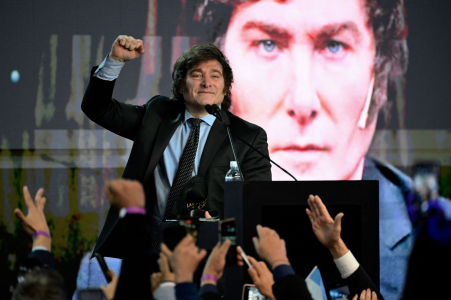BuySellBA
Administrator
‘El Loco’ Won the Argentina Election Last Month With Outlandish Ideas. Now He’s Backpedaling
December 06, 2023
Javier Milei, who pledged to kill the central bank, cut ties with China and slash public spending has taken a softer tone ahead of his inauguration

BUENOS AIRES—President-elect Javier Milei, known by the nickname “El Loco” since he was a kid, rose from university professor to social-media celebrity, making his mark as an economic libertarian and social libertine.
He won by a landslide promising to slash government spending by roughly 40% to help bring down Argentina’s triple-digit inflation. Milei wielded a chain saw in appearances to make his point. “The state is not the solution, rather the problem,” he said, in an echo of President Ronald Reagan.
It was a gutsy platform for a country of 46 million that for years has doled out generous subsidies, pensions and public-works contracts, even if it had to print money to do it.
Milei, 53 years old, wasn’t afraid to extend his stay-out-of-my-life view of government to personal matters, including drug use and same-sex marriage, risking conservative votes in a Roman Catholic country that is home to Pope Francis.
“What do I care what your sexual preference is?” Milei said in a YouTube interview a couple of weeks before the Nov. 19 election. “If you want to be with an elephant, and you have the consent of that elephant, that’s a problem between you and the elephant.”
Taxation, he said, is nothing more than armed robbery by the government. “Who are you to put your hands into my pocket?” he asked in one typically hotheaded TV talk show appearance that ended in a shouting match with another guest, who stormed offstage.
Days ahead of his inauguration Sunday, Milei is backpedaling, surprising supporters and opponents.
He has jettisoned some top economic advisers who were enlisted to help him kill the central bank and adopt the U.S. dollar as the national currency. He has aligned instead with officials from a previous center-right government that he previously derided. “No one said eliminating the central bank was going to be instantaneous,” he said Sunday.
After promising to cut ties with China—he had referred to the communist regime as assassins—he has since exchanged cordial words with Beijing. China is Argentina’s top buyer of soy, and Argentina is Latin America’s third-largest recipient of Chinese state-bank loans in South America.
Even his tone has shifted from talk-show personality to stoic voice of reason. He acknowledged the transition from nearly two decades of leftist Peronist governments to his vision of unfettered capitalism could take longer than expected. His moderation comes as powerful labor unions and social movements are lining up against him. Violent street protests have brought down Argentina presidencies in the past.
A spokesman for Milei declined requests for comment.
Three Killed in Campus Shooting in Las Vegas; Suspect Also Dead
Three people were killed and one was wounded in Wednesday’s shooting at University of Nevada, Las Vegas. Officials said the attacker was killed in a shootout with police. Photo: Steve Marcus/Las Vegas Sun/Reuters
Milei drew votes from people angry at the political establishment, not because they supported his libertarian view, according to political analysts. Many Argentines, accustomed to a nanny state, are now saying they hope his campaign promises were all talk. They worry his economic remedies will hit too close to home.
“Milei is a rich guy. He’s not going to feel the cuts like we are,” said Gustavo Pérez, a mechanic in the working-class district of San Miguel on the outskirts of the capital. He fretted over the fate of a new sewage-processing facility being built on his street, where children play soccer next to foul-smelling runoff water.
Despite being an agricultural powerhouse with massive lithium and energy deposits, Argentina is in its worst economic crisis in a generation. Two of five people live in poverty. The peso has lost 90% of its value. In November, inflation was up 147% from a year earlier.


